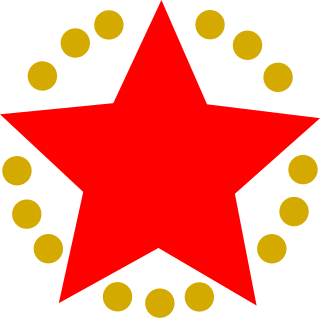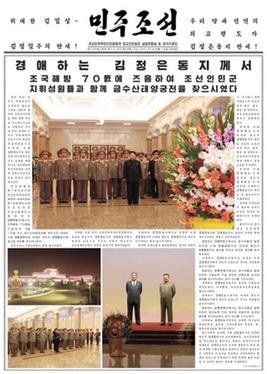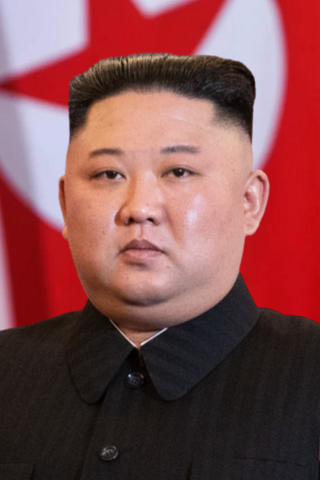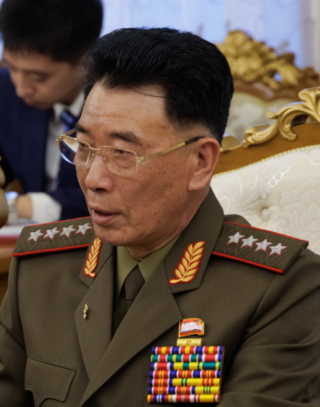Related Research Articles
Pak Pong-ju is a North Korean politician who served as the Premier of North Korea from 2003 to 2007 and again from 2013 to 2019. He was elected a member of the Presidium of the Workers' Party of Korea (WPK) in 2016.

The Supreme People's Assembly is the legislature of North Korea. It is ostensibly the highest organ of state power and the only branch of government in North Korea, with all state organs subservient to it under the principle of unified power. However, in practice it is a rubber stamp legislature which exists to approve decisions made by the ruling party as a formality, and which has little to no real power of its own.

In the North Korean government, the Cabinet is the administrative and executive body. The North Korean government consists of three branches: administrative, legislative, and judicial. However, they are not independent of each other, but all branches are under the exclusive political leadership of the Workers' Party of Korea (WPK).

The Commander-in-Chief of the Armed Forces of Democratic People's Republic of Korea is the commander-in-chief of the Korean People's Army, the military of North Korea. The office was established on 4 July 1950 and abolished with the passing of a new constitution in 1972. Since then, the office of President of North Korea, the Chairman of the National Defence Commission and the President of the State Affairs Commission have been referred to as supreme commanders in accordance with the constitution.

The President of the State Affairs Commission of the Democratic People's Republic of Korea, alternatively styled "President of State Affairs" in official translations, is the supreme leader and head of state of North Korea. The president chairs the State Affairs Commission (SAC), which is the highest leadership institution in North Korea, and serves as the commander-in-chief of the North Korean armed forces.

O Kuk-ryol was a North Korean military general. He was Chief of General Staff of the Korean People's Army from 1979 to 1988. He also served as vice-chairman of the National Defence Commission of North Korea, head of the Operations Department from April 2009 to June 2016. Foreign observers referred to O as the second most powerful man in North Korea.

Minju Choson is a state-run North Korean government newspaper. It is published in Pyongyang. It was started in 1945. It is the principal newspaper of the Cabinet of North Korea and the Standing Committee of the Supreme People's Assembly.

Choe Ryong-hae is a North Korean politician and military officer who currently serves as Chairman of the Standing Committee of the Supreme People's Assembly and First Vice President of the State Affairs Commission, holding both positions since April 2019. Due to holding the first office, he was considered the head of state of North Korea before the country's constitution was amended to transfer this position to the President of the State Affairs Commission, Kim Jong Un. He is also a member of the Presidium of the Politburo and Vice Chairman of the Workers' Party of Korea (WPK). He also served as Supreme Leader Kim Jong Un's military second-in-command, currently being third top-ranking official in North Korea after Kimulo Un and premier Kim Tok-hun.

The Cabinet of Democratic People's Republic of Korea is the supreme administrative organ of North Korea. The Cabinet's official newspaper is Minju Choson.

The State Affairs Commission of the Democratic People's Republic of Korea (SAC) is constitutionally the supreme political authority of North Korea. The State Affairs Commission was created by 2016 amendments to the North Korean Constitution to replace the previously military-dominated National Defence Commission.

The Presidium of the Political Bureau of the Workers' Party of Korea, or simply the Presidium, and formerly known as the Standing Committee (1946–61), is a committee consisting of the top leadership of the Workers' Party of Korea. Historically, it has been composed of one to five members, and currently has five members. Its officially mandated purpose is to conduct policy discussions and make decisions on major issues when the Politburo, a larger decision-making body, is not in session. While the Presidium in theory reports to the Politburo, which in turn reports to the larger Central Committee, in practice the Presidium is supreme over its parent bodies and acts as the most powerful decision-making body in North Korea. As North Korea is a one-party state, the Presidium's decisions de facto have the force of law. Its role is roughly analogous to that of the Politburo Standing Committee of the Chinese Communist Party.

Kim Jong Un has been the supreme leader of North Korea since the death of Kim Jong Il in 2011.

Elections to the provincial (municipal), city (district) and county people's assemblies in North Korea were held on 21 July 2019.

Hwang Sun-hui was a North Korean politician who served in several high-ranking positions in the Workers' Party of Korea (WPK), including in the Supreme People's Assembly and the Central Committee of the WPK. She was affiliated with the Korean Revolution Museum from 1965, and was its director from 1990.
Ri Ryong-nam is a North Korean politician serving as the DPRK's Ambassador to China since February 2021. With a background in economic affairs, Ri was a delegate to the 12th, 13th and 14th convocations of the Supreme People's Assembly, chairman of the North Korean-Syrian Friendship Association and chairman of the North Korean Football Association.
Tong Jong-ho is a North Korean politician. He is Vice Premier of North Korea in the North Korean Cabinet. He previously served as Minister of Construction and Building Industry and the Political Bureau of the Central Committee of the Workers' Party of Korea. He was delegate to the 12th convocation of the Supreme People's Assembly. He is a permanent chairman of the Korean Marathon Association.

Pak Kyong-suk was a North Korean politician. She was a seamstress in Kim Il Sung's guerrilla forces during the 1930s. After the liberation of Korea, she held posts in the Workers' Party of Korea (WPK), Democratic Women's League, as well as being a delegate to the Supreme People's Assembly.

Kang Sun-nam (Korean: 강순남) is a North Korean politician and general who was the minister of Defence from 2022 to 2024. He is also a member of the Central Military Commission of the Workers' Party of Korea (WPK) and a member of the 8th Central Committee of the Workers' Party of Korea
Jon Hyon-chol is a North Korean politician. He served as a Vice Premier of the Cabinet a candidate (alternate) member of the Politburo of the Central Committee of the Workers' Party of Korea as well as head of the Economic Policy Office of the Central Committee.
Yang Sung-ho is a North Korean politician. He is a Vice Premier and a member of the Politburo of the Central Committee of the Workers' Party of Korea. He served as Minister of Machinery and Industry, replacing Lee Jong Guk and since 2021 is serving as Minister of Agriculture in the North Korean Cabinet.
References
- 1 2 3 4 5 6 7 "김정숙" [Kim Jong-suk] (in Korean). Ministry of Unification. Archived from the original on September 10, 2014. Retrieved January 6, 2018.
- ↑ "Index Ho-Hy".
- ↑ "Mongolia, DPRK Sign Economic Agreements". 29 October 2013.
- 1 2 "North Korean Signals: The Diplomatic Commission". 25 April 2017.
- ↑ "Joint Conference of Social Organizations Held - Explore DPRK". 5 July 2017. Archived from the original on 1 September 2017. Retrieved 31 August 2017.
- ↑ "Kim Jong Suk, chairperson of the Korean Committee for Cultural Relations with Foreign Countries..." Getty Images.
- ↑ "北朝鮮、対外文化連絡委員長に金貞淑氏を任命" [North Korea appoints Kim Jong-suk as head of international cultural liaison committee] (in Japanese). 2010-02-19.
- ↑ 고 조명록의 국가장의위원회 구성 (in Korean). KCNA. 6 November 2010. Archived from the original on 11 October 2014.
- ↑ "National Funeral Committee Formed". Archived from the original on 29 May 2012. Retrieved 31 December 2011.
- ↑ "北朝鮮で最高人民会議開催…19年ぶりに外交委員会が復活". Daily NK (in Japanese). 2017-04-12.
- ↑ "北朝鮮「2017白頭山偉人称賛大会」開催]". Daily NK (in Japanese). 2017-08-16.
- ↑ 북 김정은, 최고인민회의 대의원 처음 빠져. Tong Il News (in Korean). 2019-03-12.
- ↑ "常任委員長に崔龍海、首相に金才龍氏…北朝鮮で最高人民会議". Daily NK (in Japanese). 2019-04-12.